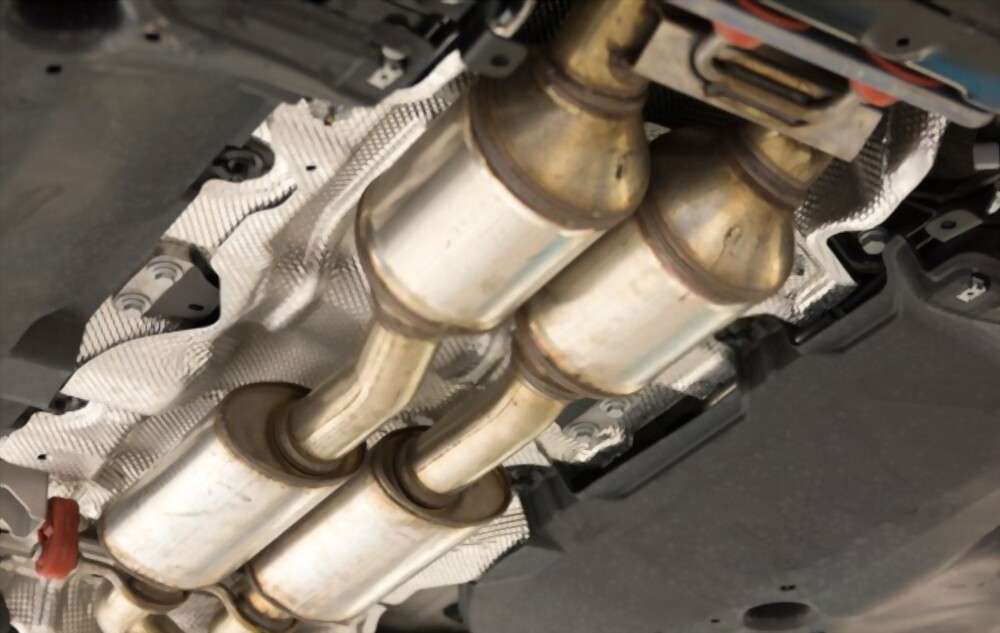The exhaust system of a vehicle is a critical component of your car. A properly working exhaust system can help reduce engine noise and provide better engine performance. It is the conduit that channels all of your engine’s harmful emissions away from the rest of your car.
A catalytic converter is an important part of the system, and lets you operate your car within legal limits. But does an exhaust system come with a catalytic converter?
Automotive catalytic converters are the unsung heroes of clean exhaust emissions, using their precious metal content to transform dangerous gases such as carbon monoxide and hydrocarbons into less harmful substances like water vapor and carbon dioxide. Every vehicle runs with its own individual converter in each tailpipe.
That’s just one question we’ll explore in this article. We’ll also cover whether or not you need to install an aftermarket cat, how much power you can expect to see, and which systems will work best for your ride.
Jump to
- 1 Does a Catalytic Converter Make Noise?
- 2 Why do exhaust systems come with a catalytic converter?
- 3 Will You Lose Power Without a Catalytic Converter?
- 4 What is an aftermarket catalytic converter?
- 5 What to look for when picking an aftermarket catalytic converter?
- 6 Benefits of using catalytic converters
- 7 FAQ’s
- 7.1 1. Can you have an exhaust without a catalytic converter?
- 7.2 2. Is catalytic converter same as exhaust?
- 7.3 3. Is a catalytic converter part of the muffler system?
- 7.4 4. Can a car sound loud without a catalytic converter?
- 7.5 Final Thoughts – Does an exhaust system come with a catalytic converter?
Does a Catalytic Converter Make Noise?
A catalytic converter will not make any noise while it’s in operation. It does, however, make a noticeable noise when you’re removing it. This is because the converter is quite heavy. If you don’t remove it carefully, you may damage your vehicle.
Why do exhaust systems come with a catalytic converter?
Exhaust systems come with a catalytic converter because they want to ensure that you’re operating your vehicle within legal limits.
If you’re not, your vehicle will be subject to fines. Your car will also emit more pollution into the air, and this can be harmful to your health. So it’s best to keep your vehicle running in the legal range. A catalytic converter will ensure that your vehicle is operating within legal limits.
Will You Lose Power Without a Catalytic Converter?
A catalytic converter is installed in your vehicle to help it meet emissions standards. But if you remove it, the following changes will occur.
- Without a catalytic converter, you’ll be exceeding legal emissions limits and the air quality in your neighborhood will be degraded.
- Removing the catalytic converter reduces back-pressure because the engine is forced to work harder to discharge the exhaust gases.
- Your vehicle will lose power because your car will be operating at a lower temperature. So you’ll be burning less fuel and generating less power.
- If you are considering replacing your vehicle’s original catalytic converter with a different one, you should know that your car will lose power if you do. This is because your car is calibrated to your specific vehicle’s original converter.
- If you remove the catalytic converter, your engine will be exposed to toxic exhaust gases and this will reduce the engine’s lifespan.
What is an aftermarket catalytic converter?
An aftermarket catalytic converter differs from the original catalytic converter in several ways. Compared to the original catalytic converter, these are the most cost-effective solutions. However, you must exercise caution while purchasing the best catalytic converters.
The reason for this is that there are several types of aftermarket drawbacks. As a result, you must select the ideal one. Most significantly, a catalytic converter must fulfill your state’s or region’s regulations as well as vehicle compatibility. If you don’t have a catalytic converter, passing the emission test will be difficult.
What to look for when picking an aftermarket catalytic converter?
Look at the power your car can generate:
If you’re looking to save money on your vehicle’s exhaust system, you may want to consider installing an aftermarket catalytic converter. But you may also want to look at the power your car will generate.
Your vehicle’s original catalytic converter will produce a maximum of 12 horsepower. If you install a catalytic converter that produces more power, you’ll be able to get more out of your engine.
Look for a high-performance aftermarket catalytic converter:
You’ll want to look at the catalytic converter that comes with your vehicle’s exhaust system. You can also install a high-performance catalytic converter. But you should know that it will cost more than the catalytic converter that comes with your vehicle’s exhaust system.
Look for an aftermarket catalytic that has a high-quality material:
If you’re looking you’ll want to look for an aftermarket catalytic converter that is made from high-quality materials. The converter’s material should be constructed from the best grade of stainless steel, so it can last for years.
You should know that the aftermarket catalytic converter you install will be exposed to extreme temperatures and pressures. So you’ll want to look for a durable converter.
Benefits of using catalytic converters

Here are some of the reasons why you should use a catalytic converter when driving:
Avoiding Penalties:
A catalytic converter is not something that your car can or cannot do. Rather, it’s a honeycomb-shaped device mounted on the underside of your vehicle that converts hazardous pollutants into water and carbon dioxide. To protect the environment from pollutants, a catalytic converter is required. If someone breaks this rule, they will be fined. So driving with the catalytic converters helps you to avoid fines and penalties.
Increase Engine Lifetime:
If you’re using a catalytic converter, you’ll be able to extend the life of your engine. The reason for this is that the converter works as a filter that removes harmful exhaust gases from the engine.
Avoid Harmful Effects on the Environment:
If you are not using a catalytic converter, your vehicle’s exhaust will be released into the air. This is harmful to the environment, and as a result, the environment and human life will be harmed.
So, driving with the catalytic converters will help to clean up the air that is released into the environment.
FAQ’s
1. Can you have an exhaust without a catalytic converter?
Without a catalytic converter, cars may be able to operate in the short term but this type of operation is not sustainable for long-term use. To ensure that your vehicle will run smoothly and efficiently over time, it’s important to install an efficient catalytic converter.
2. Is catalytic converter same as exhaust?
Your car’s exhaust system is doing more than just making noise – it contains a special part known as the catalytic converter. This device, which looks similar to a muffler and lies between engine and muffler, works hard to turn potentially harmful compounds from your automobile’s exhaust into non-toxic substances.
3. Is a catalytic converter part of the muffler system?
Your car’s catalytic converter is a vital part of the exhaust system, located between your engine and muffler. It looks like an extra-large muffler that rests on the underside of your vehicle; working hard to keep emissions low while you drive.
4. Can a car sound loud without a catalytic converter?
Without a catalytic converter, the experience of driving your vehicle can come with an unexpected sound – a roar! Be aware that this missing component is actually responsible for helping to muffle some engine and exhaust noise.
Final Thoughts – Does an exhaust system come with a catalytic converter?
To keep your car and the environment healthy, you need catalytic converters. The catalytic converter installed in your vehicle is very important to keep your car’s engine in good condition.
If you want to replace it with an aftermarket catalytic converter, make sure it’s of high quality.
We discussed the benefits of catalytic converters in this article, but we also explored the factors to consider when choosing a catalytic converter for your vehicle. We hope this article helped you better understand catalytic converters. Feel free to ask any questions in the comment section below.

My name is Tom Harris, founder of this blog. I’m a mechanical engineer with 20 years of experience in the automotive industry. I’m here to help you with your vehicle’s problems, easy fixes and share my insights and experience so that you can enjoy your rides more.


1 thought on “Does an Exhaust System Come with A Catalytic Converter?”